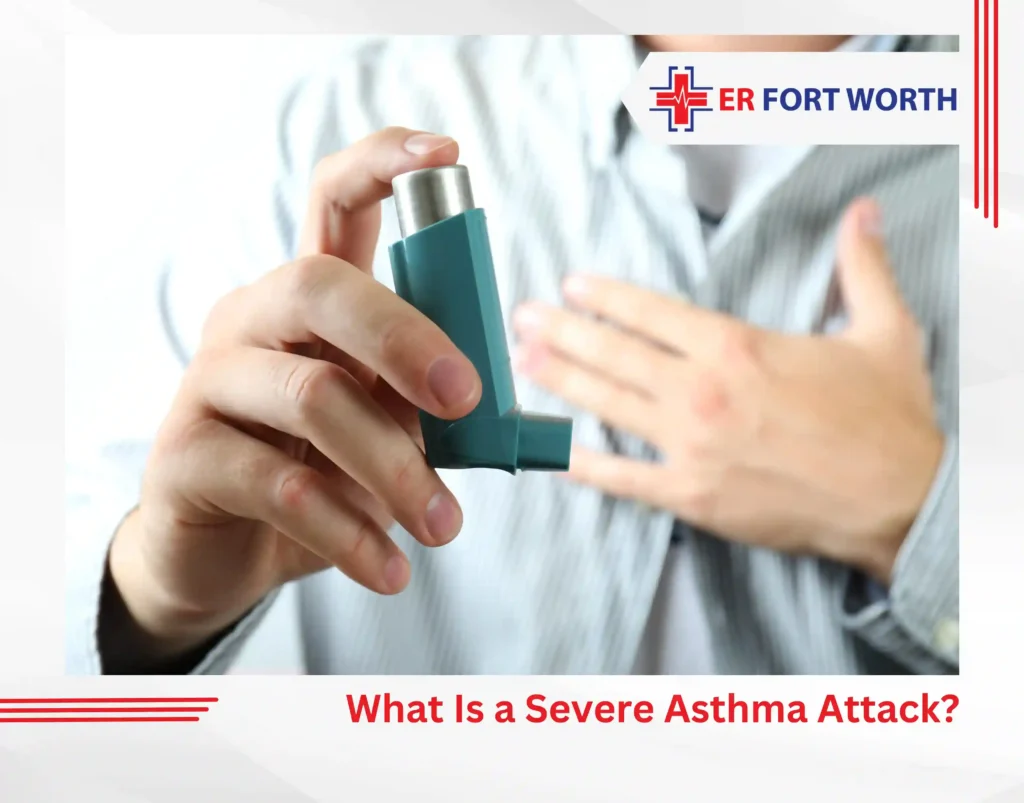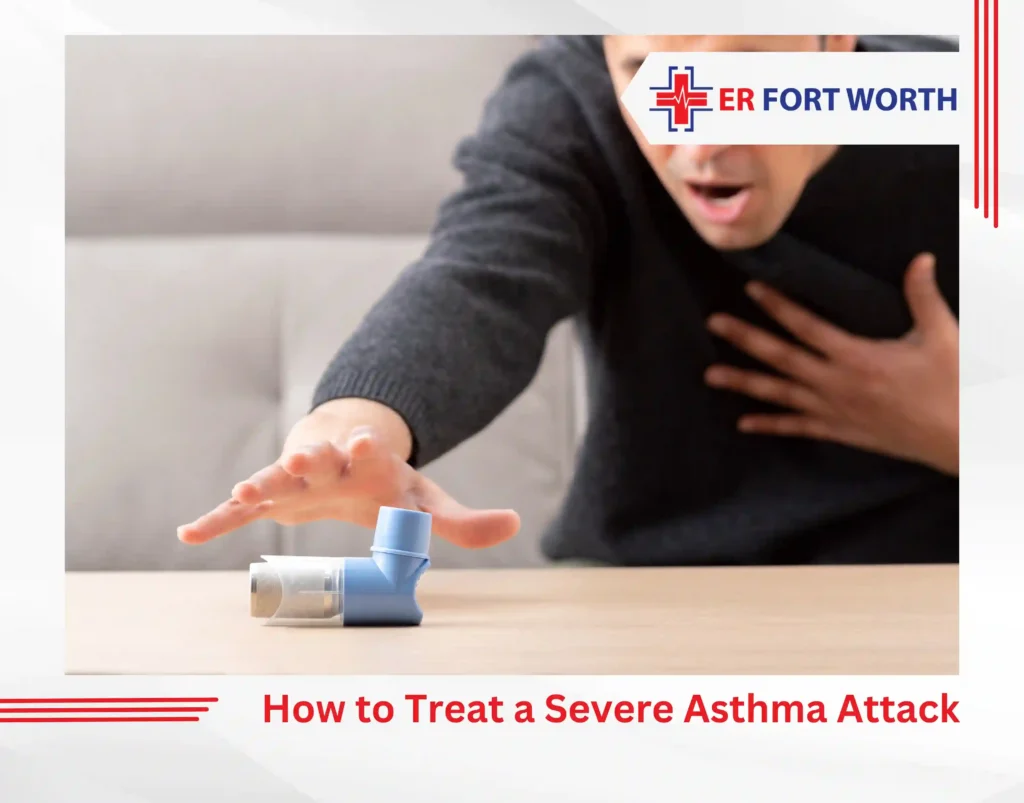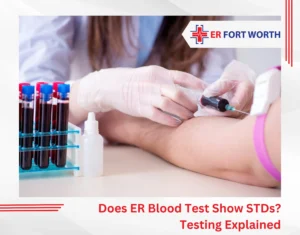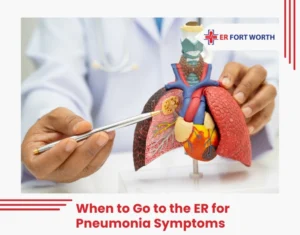Your rescue inhaler isn’t working this time. When the wheezing persists, and breathing becomes increasingly difficult, you realize this might be a severe asthma attack. How do you know when a manageable asthma episode becomes a severe asthma attack requiring emergency care?
Every attack presents unique warning signs that distinguish it from routine breathing difficulties. Recognizing these critical signs and responding with the right medication for severe asthma attack can prevent your condition from becoming life-threatening.
Our Fort Worth ER provides immediate intervention with oxygen therapy, nebulizer, and IV treatments, when standard inhalers fail. Let’s explore what you need to know when your asthma requires emergency care and why quick access to these advanced treatments matters.
What Is a Severe Asthma Attack?

A serious asthma episode, or acute asthma, happens when the airways are dangerously inflamed and constricted. This restricts airflow, making every breath a struggle. Unlike mild attacks that respond to rescue inhalers, severe attacks resist standard treatments as your airways continue to tighten. This progressive worsening, combined with failure of usual medications for asthma, creates a medical emergency requiring immediate intervention.
Symptoms of a Severe Asthma Attack
The signs of severe asthma may resemble those of mild to moderate asthma. However, severe asthma symptoms are generally more intense, possibly life-threatening, and don’t improve with regular asthma medications. Key warning signs of a severe asthma attack include:
- Severe Shortness of Breath: Even simple tasks like walking or lying down become difficult as your airways narrow severely. This persistent breathlessness doesn’t improve with rest.
- Inability to Complete Sentences: When breathing becomes so labored that you must pause frequently while speaking, it signals dangerously compromised lung function.
- Persistent Wheezing: A continuous, high-pitched whistling sound during breathing that doesn’t respond to your rescue inhaler is a tell tale sign of a severe asthma attack.
- Chest Pain: A crushing or squeezing pain in your chest that intensifies with each breath points to serious airway constriction and muscle spasms.
- Mucus Production: A sudden increase in thick mucus or changes in its color to yellow or green can indicate worsening inflammation or infection requiring prompt care.
- Bluish Discoloration: When lips or fingernails take on a bluish tinge (cyanosis), it means your body isn’t getting enough oxygen.
- Shallow Breathing: Quick, ineffective breaths that don’t deliver sufficient oxygen indicate your airways are severely compromised.
- Severe Anxiety or Panic: As breathing becomes increasingly difficult, you may experience intense panic as a natural response to oxygen deprivation.
Recognizing these warning signs is crucial, but understanding what triggers them can help you better manage severe asthma. Let’s explore the underlying causes of the most common severe asthma symptoms and why they occur:
Causes of Wheezing and Persistent Cough
Your airways may react severely to various triggers, including:
- Respiratory infections
- Allergic reactions
- Exercise or physical exertion
- Cold air exposure
- Strong irritants or pollutants
- Stress or anxiety
- Certain medications
Understanding Mucus Production
Excessive mucus during an attack can result from:
- Airway inflammation
- Bacterial or viral infections
- Allergic responses
- Environmental irritants
- Chronic respiratory conditions
Recognizing Chest Tightness
Several factors can intensify chest tightness:
- Bronchial muscle spasms
- Airway inflammation
- Trapped air in lungs
- Anxiety-induced muscle tension
- Heart-related complications
Don’t wait for multiple symptoms to appear. If you experience any of these warning signs, visit the nearest emergency room for common heart tests and other necessary evaluations. At our Fort Worth ER, we specialize in treating severe asthma attacks before they become life-threatening.
How to Treat a Severe Asthma Attack

If you or someone near you experiences a severe asthma attack, follow these steps:
Use a Rescue Inhaler
At the onset of the asthma attack, promptly use a quick-relief inhaler, such as albuterol. If a spacer is available, attach it to enhance the delivery of the medication. This allows the medication to penetrate deeper into the airways. Administer 2-6 puffs, waiting one minute between each puff to maximize the medication’s effectiveness.
Follow the dosage outlined in your asthma action plan if it differs from this recommendation. Always check that your inhaler is not expired and is readily accessible, particularly if you have a history of severe asthma.
Contact Emergency Services
If your asthma symptoms escalate or don’t improve after using the inhaler, call 911 or visit an emergency room for asthma treatment. Provide the dispatcher with clear information regarding the severity of the asthma attack, noting if the individual is unresponsive or showing symptoms such as bluish lips or significant difficulty in speaking.
Prompt action is crucial in severe asthma situations, as paramedics can administer oxygen or other advanced treatments while en route to the hospital.
Maintain an Upright Position
Refrain from lying down, as this can compress the lungs and hinder breathing. Instead, sit upright in a comfortable position, ideally with back support. Lean slightly forward, placing your hands on your knees or another stable surface. This posture alleviates pressure on the diaphragm and promotes optimal airflow through the airways.
Practice Breathing Techniques
Engaging in controlled breathing can help prevent hyperventilation, which may worsen asthma symptoms. Consider using pursed-lip breathing: inhale deeply through your nose for a count of two, then exhale slowly through pursed lips for a count of four, as if blowing out a candle.
This method helps to keep the airways open longer, alleviating the feeling of breathlessness and reducing anxiety, which can exacerbate an attack.
Administer Additional Medication if Prescribed
If your healthcare provider has prescribed oral corticosteroids, such as prednisone, for severe asthma attacks, take them as directed. These medications work systemically to decrease airway inflammation, although they may take time to become effective. Ensure that you have these medications on hand, particularly if you have a history of severe attacks.
Medication for Severe Asthma Attacks
Emergency treatment for severe asthma attacks often requires multiple medications working together. Here’s how different types of emergency medications help restore breathing:
Quick-Relief Medications
Emergency rooms use fast-acting bronchodilators through nebulizers or inhalers to rapidly open constricted airways. Medications like albuterol work within minutes to help ease breathing difficulties.
Anti-Inflammatory Treatments
When quick-relief medications aren’t enough, we may use stronger anti-inflammatory medications to reduce airway swelling and inflammation. These can be administered through IV for faster relief during severe attacks.
Advanced Treatment Options
For severe cases that don’t respond to initial treatments, emergency care may include:
- Additional bronchodilators
- Specialized breathing treatments
- IV medications
- Supplemental oxygen therapy
Long-Term Control
While emergency treatments focus on immediate relief, your doctor may discuss long-term medication options to prevent future severe attacks. These might include different types of maintenance medications based on your specific asthma pattern.
At the Fort Worth ER, we maintain a comprehensive range of emergency asthma medications and breathing treatments. Our emergency team is experienced in quickly assessing which combination of treatments will work best for your specific situation.
Can a Severe Asthma Attack Kill You?

Severe asthma attacks, or acute asthma exacerbations, can escalate into life-threatening complications if not treated promptly. In some cases, they can progress to respiratory failure, a condition in which the lungs fail to supply adequate oxygen to the bloodstream or efficiently expel carbon dioxide.
Without immediate intervention, this oxygen deprivation can lead to organ failure and, ultimately, death.
Factors Contributing to Asthma-Related Fatalities
Several factors can turn a severe asthma attack into a medical emergency:
- Inadequate Treatment: Many serious complications occur simply because people wait too long to seek emergency care
- Symptom Misinterpretation: Not recognizing when an attack is becoming severe
- Poor Asthma Management: Lack of a clear asthma action plan for managing asthma attacks
Potentially Life-Threatening Complications
When severe asthma attacks aren’t treated promptly, they can lead to serious complications:
- Respiratory Failure: Severe airway blockage can prevent proper breathing
- Oxygen Deprivation: Reduced oxygen levels can affect vital organs, including your brain and heart
- Collapsed Lung: In rare cases, severe coughing and breathing difficulties can lead to air leaking around your lungs
- Heart Problems: The strain of difficult breathing can affect your heart rhythm
Don’t wait until an attack becomes severe. If your regular asthma medications aren’t providing relief, seek emergency care immediately. At our emergency facility, we have the expertise and equipment to treat severe asthma attacks quickly and effectively.
Strategies to Prevent Asthma-Related Fatalities
- Follow an Asthma Action Plan: Work with your healthcare professional to develop a personalized treatment strategy.
- Regular Monitoring: Attend scheduled appointments and modify treatment as necessary.
- Proper Use of Medications: Always have a rescue inhaler on hand and adhere to prescribed maintenance medications.
- Avoid Triggers: Identify and reduce exposure to asthma triggers such as allergens, pollution, and smoke.
- Recognize Emergency Signs: Seek urgent medical attention if symptoms worsen despite intervention.
Don’t hesitate to seek help during a severe asthma attack. Symptoms such as extreme shortness of breath, severe chest tightness, or difficulty speaking in full sentences indicate the need for urgent care.
Follow the 4:4:4 Rule for Asthma Attacks
When experiencing a severe asthma attack, follow these steps:
- Sit upright and lean slightly forward
- Take 4 puffs of your rescue inhaler
- Wait 4 minutes
- If needed, take 4 more puffs
If symptoms persist after following these steps, you need immediate emergency care.
Expert Emergency Care for Asthma in Fort Worth
Our emergency room in Fort Worth offers comprehensive care for asthma attacks and other respiratory crises. Our in-house laboratory testing services provide pulmonary function evaluations, blood gas analysis, allergy assessments, complete blood count (CBC) tests, and more—all accessible 24/7.
Don’t wait until breathing becomes severely difficult. In respiratory emergencies, early treatment makes a significant difference. If you’re concerned about worsening symptoms, visit our facility immediately for expert care.
Get Emergency Treatment for Severe Asthma
FAQs
How do you calm a severe asthma attack?
To relieve a serious asthma attack, use your rescue inhaler and maintain an upright position to expand your airways. If symptoms do not get better, contact emergency services immediately.
What is the IV treatment for severe asthma?
IV treatments for severe asthma include magnesium sulfate to relax the airways and corticosteroids to reduce inflammation. These are typically administered in a hospital setting under medical supervision.
How long can an asthma attack last?
Mild asthma attacks may last just a few minutes, while more severe episodes can persist for hours or even days.




